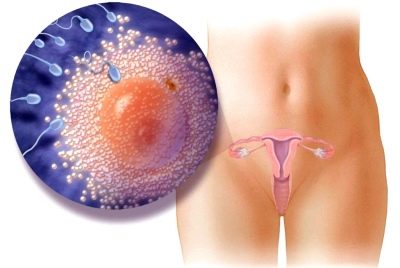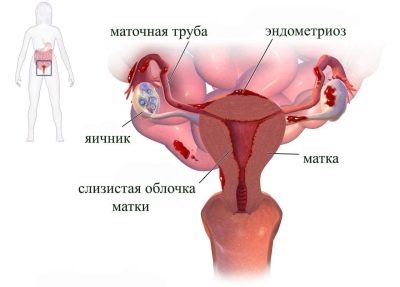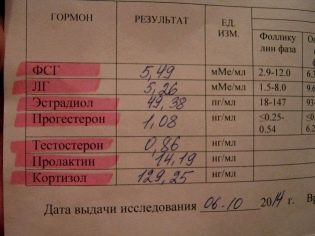Can menstruation begin after conception?
The female body can give a lot of surprises. Monthly after conception is one of such unexpected phenomena. Such a phenomenon happens rarely, but still it has a place to be and worthy to consider it in more detail.
Menstruation mechanism
To better understand the essence of the issue, you should be well aware of how regular menstruation occurs. In the first half of the menstrual cycle, the uterus begins to acquire additional membranes that thicken its endometrium.
During ovulation, the finished and mature egg leaves the follicle on the ovaries into the fallopian tube. If there is a meeting with sperm, pregnancy will come. If there is no such meeting, the egg cell will die in a day and descend into the uterine cavity.
The uterine membranes, enlarged over a cycle, in the absence of pregnancy, as unnecessary, are simply removed from the body outside in the form of menstrual bleeding. If the pregnancy comes, everything changes.
Changes in the body after conception
After fertilization of the ovum by the sperm cell in the woman’s body, a mass of various processes immediately start to preserve the pregnancy. The hormonal background is changing, large concentrations of progesterone are being produced. This sex hormone prepares the uterus for the upcoming implantation of the ovum, the endometrium of the female reproductive organ becomes thicker, friable. The hormone suppresses immunity, so that the germ that is not 50% by chance is akin to the female body by accident. The child inherited the second half of the genetic material from the father.
Progesterone relaxes the uterine muscles. About a week after fertilization, the blastocyst, which has become a fertilized egg, descends into the uterus and attaches to one of the walls, in close contact with the endometrium. It practically grows into the wall of the uterus. From this moment on, the hormone hCG, a human chorionic gonadotropin, begins to be produced. It was he who combined with a high level of progesterone leads to a delay in the next menstruation.
The baby grows and develops in the womb within 38 weeks. By the end of the first trimester of pregnancy, hCG levels peak and begin to decline, and progesterone begins to decline closer to childbirth. Actually, its decrease to a certain concentration causes the generic process itself.
In 95% of women, this is exactly what happens. But there are also such pregnant women who can for a long time not guess about their “interesting” position, since they have periods. And only the growing uterus and other symptoms will put everything in its place.
Causes of menstruation after conception
The normal occurrence of menstruation after conception is rather difficult to count. There is an opinion among the people that menstruation after a delay is a sign of the so-called “ablution of the fetus”. Doctors do sometimes come across this phenomenon, and it can be quite difficult to explain it.
But normally this happens only once - in the first month of pregnancy. In the future, any bleeding will be considered a threat of abortion.
A slight bleeding, resembling menstruation, may occur after conception in about two weeks., that is, in the period of the next menstruation in the event that a woman has a two-horned uterus or, in this cycle, two eggs come out of the follicle during ovulation, and only one is fertilized. Next month there should be no such discharge anymore.
If the pregnancy test showed two strips, and the next day or a few days later the woman started menstruating, it can speak not only about the release of the second, “unnecessary”, dead egg, but also that the fertilized egg could not properly implant and rejected. There can be many reasons: chromosomal abnormalities of the embryo, which made it impossible to further normal development and growth, exposure to toxins, gynecological diseases, which include endometriosis and other inflammatory and infectious diseases.
The reason for unplanned menstruation after conception may be a failure in the woman's menstrual cycle. If ovulation occurred late, then it is possible that at the time of the arrival of the monthly implantation is not yet complete. This happens very rarely, but a woman should be aware of this possibility.
However, in most cases, for menstruation, a woman accepts other secretions that are also bloody. There are some situations in which a woman may experience such discharge after fertilization.
Implantation
At 7-8 days after ovulation, a woman may begin a slight bloody or blood-like daub. She does not talk about pathology, but rather is the very first sign of pregnancy a week before the delay. The implantation of the endometrium is impaired during the implantation of the ovum, which may appear as insignificant and non-intensive bloody or yellowish secretions. At first, a woman may well take such a phenomenon as an early onset of menses, to think that a “failure” of the cycle has occurred.
However, this “menstruation” unexpectedly ends the next day or the next day. This convinces a woman that she "has definitely failed." However, the test strips after 7-10 days show confident and bright two strips.
Implant bleeding is not always the case and not every woman. Quite often, this delicate and delicate process takes place completely unnoticed for the future mother's state of health.
Hormonal disorders
Discharge, similar to the monthly, but only much more scarce and short, can go after conception due to hormonal deficiency. Progesterone deficiency, low levels of hCG and other metabolic imbalances may well lead to bloody discharge in the early stages.
It is noteworthy that the main danger of hormonal insufficiency lies not even in atypical discharge, but in the threat of spontaneous abortion.
A woman necessarily needs medical assistance. Treatment will be aimed at filling the deficit, hormone therapy will help save the pregnancy and save the expectant mother from bloody frightening secretions.
Trauma to the vagina or cervix
Almost immediately after fertilization, changes in the mucous membranes begin. Under the influence of pregnancy hormones, they become more loose, vulnerable, the blood vessels are easily injured. Therefore, bleeding that appeared after intercourse may well be the result of mechanical injury to the delicate mucous membranes. More abundant discharge with a slight aching pain syndrome may indicate trauma to the cervix.
Such injuries do not mean that a woman can not bear the child. But here it is not necessary to refuse medical examination and consultation. Discharge after mechanical injury is not of a long-term nature. After a few hours of bleeding, they change to blood, and then disappear.
Miscarriage
If the ovum has already begun to peel off, it has died, or it is still alive, but already doomed, then the bleeding will be accompanied by nagging and cramping pains in the lower abdomen. In the discharge will be noticeable clearly visible clots.
A woman in this situation needs prompt medical assistance. If the uterus cannot get rid of the remnants of the ovum, severe inflammation and life-threatening sepsis can develop.
Bubble skid
Fertilization of an inferior egg cell can lead to a violation of its fragmentation. As a result, embryonic structures are not formed, and instead of them in the uterus is observed a vesicle drift - cysts in the form of a bunch of grapes. A chromosome-free egg cannot produce any genetic material, with the result that only the paternal cells are doubled.
Bubble drift - a dangerous condition, a woman as soon as possible to carry out curettage and eliminate cysts from the uterine cavity. From the earliest terms, the vesicular skid may be carried out with regular bleeding, similar to monthly, as well as severe toxemia, or more precisely intoxication.
findings
Monthly after conception in the norm does not happen. Any bleeding is a reason for a speedy examination by a qualified doctor and a thorough examination. Calling monthly bleeding during pregnancy is wrong. And any bleeding, with the exception of implantation, is a warning sign.
That is why a woman needs to more closely monitor her menstrual cycle, know its features, monitor the regularity of menstruation, even if she is not currently planning a pregnancy.
It is necessary to regularly (at least once a year) visit a gynecologist and be tested for hormones.
If there is confidence that the conception was successful, the tests confirmed that the pregnancy has come, any unusual discharge will be considered as abnormal, inadmissible. And an experienced doctor will help establish and eliminate their exact cause, if possible.
About what happens in the first 2 weeks after conception, see below.






















